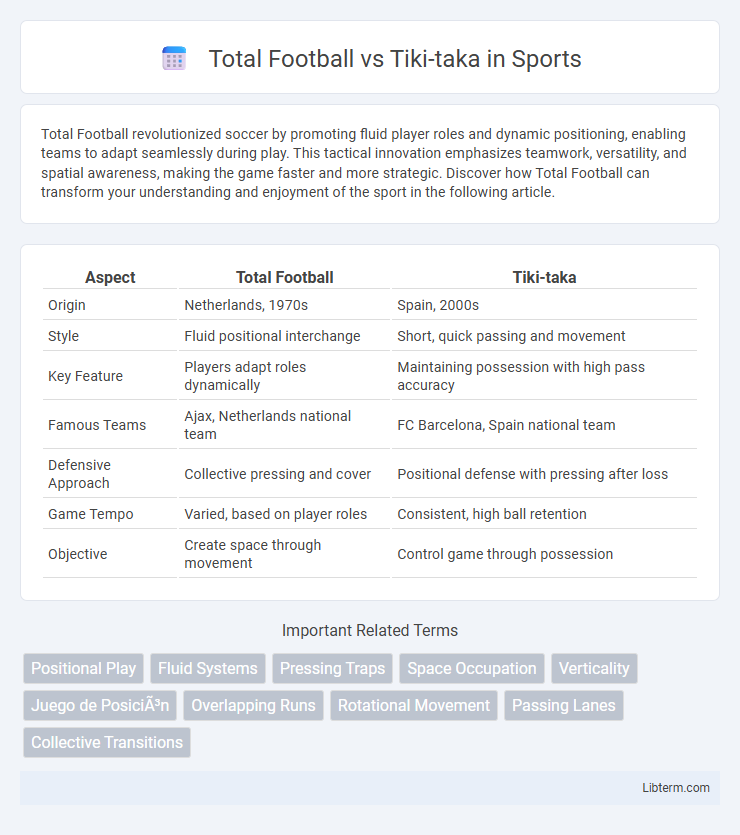Total Football revolutionized soccer by promoting fluid player roles and dynamic positioning, enabling teams to adapt seamlessly during play. This tactical innovation emphasizes teamwork, versatility, and spatial awareness, making the game faster and more strategic. Discover how Total Football can transform your understanding and enjoyment of the sport in the following article.
Table of Comparison
| Aspect | Total Football | Tiki-taka |
|---|---|---|
| Origin | Netherlands, 1970s | Spain, 2000s |
| Style | Fluid positional interchange | Short, quick passing and movement |
| Key Feature | Players adapt roles dynamically | Maintaining possession with high pass accuracy |
| Famous Teams | Ajax, Netherlands national team | FC Barcelona, Spain national team |
| Defensive Approach | Collective pressing and cover | Positional defense with pressing after loss |
| Game Tempo | Varied, based on player roles | Consistent, high ball retention |
| Objective | Create space through movement | Control game through possession |
Origins and Historical Context
Total Football originated in the 1920s Netherlands and was later popularized by Ajax and the Dutch national team in the 1970s under coach Rinus Michels, emphasizing fluid positional play and collective teamwork. Tiki-taka emerged in the late 2000s, rooted in FC Barcelona and the Spanish national team, characterized by short passing, maintaining possession, and spatial control influenced by Johan Cruyff's philosophies. Both styles revolutionized football tactics by promoting player versatility and strategic ball movement, reflecting their unique cultural and historical backgrounds.
Core Philosophies Compared
Total Football emphasizes fluid positional interchange and collective team movement, allowing players to adapt dynamically to various roles on the pitch. Tiki-taka prioritizes short, precise passing and maintaining possession to control the game's tempo, focusing on spatial awareness and quick decision-making. Both philosophies rely on high technical skill and teamwork but differ in tactical execution and positional rigidity.
Key Tactical Principles
Total Football emphasizes fluid positional interchange, high pressing, and collective team movement to exploit space and overload opponents dynamically. Tiki-taka focuses on short, precise passing, maintaining possession, and patient build-up play to control the tempo and break down defenses methodically. Both tactics rely on spatial awareness and technical skill but differ in approach: Total Football prioritizes adaptability and verticality, while Tiki-taka centers on possession dominance and horizontal ball circulation.
Legendary Teams and Managers
The total football philosophy, epitomized by the Dutch national team under Rinus Michels and Johan Cruyff, revolutionized positional fluidity and collective pressing, enabling teams like Ajax and Barcelona to dominate European football in the 1970s and beyond. Tiki-taka, popularized by Pep Guardiola's Barcelona and Spain's national team, emphasizes short passing, spatial control, and patient build-up, leading to unprecedented success including multiple La Liga titles, UEFA Champions League triumphs, and Spain's 2010 World Cup victory. Legendary managers such as Michels and Guardiola are celebrated for molding their squads around these distinct tactical identities, shaping modern football's strategic evolution.
Player Roles and Positioning
Total Football emphasizes fluid player roles with defenders, midfielders, and forwards interchangeable to create unpredictable attacking patterns, relying heavily on spatial awareness and adaptability. In contrast, Tiki-taka prioritizes maintaining possession through short passes and positional rotations mainly within a defined midfield framework, where players occupy specific zones to control tempo and exploit tight spaces. While Total Football demands multifunctional athletes capable of dynamic role shifts, Tiki-taka depends on precise positioning and collective movement to sustain dominance in ball control.
Influence on Modern Football
Total Football revolutionized modern football by introducing fluid positional play and versatile player roles, influencing tactical flexibility and pressing strategies in today's game. Tiki-taka enhanced possession-based football, emphasizing short passing, spatial awareness, and high defensive lines, shaping teams like FC Barcelona and Spain's national squad to dominate global competitions. Both styles have deeply impacted coaching philosophies, with many contemporary teams blending elements from both to optimize control and adaptability on the pitch.
Strengths and Weaknesses
Total Football excels in tactical flexibility allowing players to interchange positions fluidly, enhancing unpredictability and spatial control; however, it demands exceptionally versatile and highly skilled players to execute effectively. Tiki-taka emphasizes short, quick passes and maintaining possession to dominate tempo and minimize turnovers, but its reliance on continuous ball control can lead to vulnerability against high-pressing opponents and fast counterattacks. Both strategies require exceptional team cohesion yet differ in approach--Total Football prioritizes dynamic positional interchange, while Tiki-taka focuses on possession-based control.
Notable Matches and Rivalries
Total Football and Tiki-taka have clashed in several notable matches that defined modern football tactics, including the 2010 FIFA World Cup final where Spain's Tiki-taka outmaneuvered the Netherlands' Total Football-inspired approach. The intense rivalry between AFC Ajax, synonymous with Total Football, and FC Barcelona, the cradle of Tiki-taka, highlights contrasting philosophies in club football. Matches between these teams in the UEFA Champions League often serve as tactical masterclasses, showcasing the fluid positioning of Total Football against the short passing and positional play of Tiki-taka.
Adaptations and Evolutions
Total Football, pioneered by the Dutch in the 1970s, emphasizes fluid positional play and high pressing, allowing players to interchange roles seamlessly and adapt to in-game situations dynamically. Tiki-taka, developed by Spain and Barcelona in the 2000s, evolved from this foundation by prioritizing short, quick passes and maintaining possession to control the game's tempo, demanding exceptional spatial awareness and precise ball control from players. Both styles have continuously adapted to modern tactical trends, with Total Football incorporating advanced pressing systems and Tiki-taka integrating faster transitions to counter counter-attacking threats.
Legacy and Global Impact
Total Football revolutionized soccer in the 1970s with its fluid positional play and collective team responsibility, inspiring generations of coaches and players globally. Tiki-taka, popularized by FC Barcelona and Spain in the late 2000s, emphasized short passing and ball possession, reshaping modern football tactics and influencing clubs worldwide. Both styles left enduring legacies by advancing tactical innovation and elevating the strategic complexity of the game on an international scale.
Total Football Infographic

 libterm.com
libterm.com